By Nic Custer
Michael Hood knew from 30 years as a wilderness guide that a canoe can’t get from shore to shore unless the rotten wood is replaced first. This metaphor is what inspired the name for Crossing Water, an Ann Arbor-based organization playing a crucial role in Flint’s water crisis.
Crossing Water, Hood’s volunteer outreach organization, is applying multi-disciplinary approaches to finding gaps in social services for Flint residents dealing with the water crisis. They help residents regain some sense of control and receive enough support to succeed beyond their current struggles.
The group’s Rapid Response Service Team method (RRST) attempts to benefit low income residents who may be getting missed by other water recovery services.
Crossing Waters’ service teams of social workers, firefighters, plumbers, nurses and others are visiting some of Flint’s most vulnerable residents. Teams of two to three people bring water bottles to residents’ homes and also offer other services like installing filters, educating residents about the filters, replacing faucets and sinks if necessary, and providing child and mother health assessments.
Any issues they are unable to resolve are referred to local medical and social workers. Once a household is identified, the group regularly returns with additional bottled water and support services.
“Our goal is to turn gaps into peaks and make sure those folks are getting the highest level of services,” Hood said.
A recent social work graduate from Eastern Michigan University, Hood said the organization started as a class project aimed at domestic violence.

Michael Hood
He has run his own business, Vertical Ventures, for the last 30 years. He teaches rock climbing and wilderness courses to groups across the state. But Hood temporarily closed the business in order to focus on volunteering and implementing Crossing Water’s work.
“Some people say I’ve been doing social work for 30 years. As an outdoor guide and a climbing guide, you hear a lot of people’s problems,” Hood said. Part of his work as a climbing guide has been to motivate and counsel people to do things they wouldn’t normally be able to do like climb a 100 foot cliff. After a midlife crisis, he decided to go back to school to make it official, receiving an education in social work.
While the water crisis story developed, Hood saw gaps in service and decided to act. He emailed National Association of Social Workers members statewide, 225 of whom initially volunteered to help in Flint. Since then the group has also recruited volunteers through Facebook, word of mouth and media coverage.
In seeking out vulnerable populations like homeless or disabled individuals, Crossing Water staff knock on doors and wait for several minutes. If no one answers, the team asks neighbors on either side of the house whether or not it is occupied. Hood said usually the neighbors will be able to identify if there is someone living in the home that may need help.
The needs are staggering and urgent, Hood discovered. Through March, Crossing Water volunteers still were finding families who didn’t know there was lead in the water. Hood said 75 percent of low income homes that the group visits have non-working filters including filters that are improperly installed, deactivated by use of hot water, sitting in a box on the kitchen table or that the resident doesn’t even have a faucet.
Hood said he and his volunteer teams quickly learned there is considerable mistrust of government agencies.
He said the introduction their staff uses door to door is, “Hello we are Crossing Water, we are not from the government and we are here to help you.
“One of our hallmarks is that we are pretty smart. We don’t follow rules, we tend to break through stuff and do things in ways others can’t,” Hood said.
Crossing Waters has partnered with Flint Rising and initially influenced the addition of five social service questions to the survey Flint Rising volunteers took door to door. Depending on how residents answered the questions, the Crossing Water team would know whether they should deliver additional services to the household.
Crossing Water’s RRST model was developed in January. The model which is based on referrals, sends multi-ethnic, multi-gender teams to homes across Flint, primarily on the east side. The teams give out binders full of information and take between twenty minutes to an hour to listen to the resident’s concerns. As many as 13 teams are deployed across Flint at any one time. Each volunteer receives a two-hour educational training before going out in the neighborhoods.
About ten percent of the group’s volunteers are Flint residents. Other volunteers come from Traverse City, Kalamazoo, Grand Rapids, Mackinaw City, Chicago and Indiana.
The group does more than many organizations on the ground in Flint. Hood said they have held dental labs for children of undocumented immigrants, replaced thousands of dollars in plumbing out of their own pockets, replaced an elderly woman’s furnace, and furnished an undocumented immigrant family’s house with three beds, dressers, a refrigerator and a microwave.
Hood is currently is talks with Genesee Health Systems and other organizations about training social workers, water distribution volunteers and church groups how to ask specific RRST questions about social and health issues. This will help standardize some of the data collection around Flint and allow for Crossing Water to offer follow up services to individuals who need them.
Based on their relationship with Flint Rising, the group has been able to work out of the basement of St. Michael’s Catholic Church for the past several months. But each night Hood has had to uproot his operation, packing all of Crossing Water’s materials into his truck and bringing everything back the next day. In the May, the group will be moving operations to Salem Lutheran Church, 2610 M.L. King Ave., which is donating a suite of offices and use of a conference room. Hood said he is grateful for the support and it will allow for more operational time and less stress overall to have a permanent home for the group’s materials. Salem Lutheran will also be helping Crossing Water fundraise and write grants as it applies to become a nonprofit.
For the first few weeks of his work Hood was very affected by what he saw residents experiencing and would cry all the way home. Staff help residents work through trauma they are experiencing as a result of the crisis but this takes its toll on volunteers. At end of every shift, Crossing Water volunteers have a confidential debrief where they share one of their experiences or a poignant story from the day.
Crossing Water is responsible for the 22 multi-lingual billboards across Flint that warned residents boiling water does not remove lead. A new set of 10 billboards in early May warn residents not to run hot water through filters.
The billboards are clearly identified with the Crossing Water logo because, Hood said, the organization has become a trusted information source in the community. Additionally the group has sent out 15,000 postcards about not boiling water to all the houses Flint Rising has visited.
Crossing Water is working toward a $100,000 fundraising goal through Crowdrise and is seeking donations of computers, iPads and gasoline gift cards for staff to use.
After months of unrelenting efforts, Hood said there is a sense of volunteer fatigue and he is seeking volunteers to help the fill the gaps. Crossing Water needs nurses, mental health professionals, construction workers, HVAC specialists, plumbers, lawyers familiar with landlord issues, teachers and translators of Spanish, Arabic and French for North African immigrants. Hood says he is also seeking massage therapists and cooks willing to help volunteers at the end of the workday.
“This is the work of my life, I love this work. It’s beautiful work, I get energized by it but it kills me that there are so many people we can’t reach because there aren’t enough of us,” Hood said.
Visit crossingwater.org for more information.
Nic Custer is the managing editor of East Village Magazine and can be reached at nicpublishing@gmail.com.








You must be logged in to post a comment.